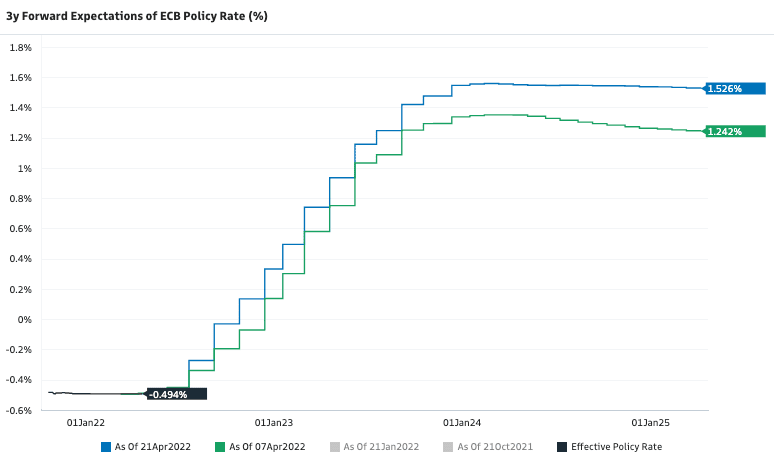ECB Fighting the Euro's Decline says ABN AMRO
- Written by: Gary Howes
- EUR boosted by ECB rate talk
- In potential effort to shore up EUR
- Investors ramp up hike expectations
- But EUR gains prove reluctant to stick

Image © European Union, reproduced under CC licensing
A crescendo of calls for a summer interest rate hike by members of the European Central Bank's Governing Council this week could be part of a concerted effort to prop up the value of the Euro, according to an analyst.
The ECB is trying to "dampen inflation expectations and euro decline," says Nick Kounis, Head of Financial Markets at ABN AMRO, the Dutch based international financial services provider.
Kounis' call comes on the back of a number of verbal interventions by prominent members of the ECB to raise interest rates, with some saying a hike could come as early as July.
The Euro registered gains on Wednesday and Thursday after ECB Vice President Luis de Guindos said the ECB should be able to phase out asset purchases in July to pave the way for an interest-rate increase as early as that month.
The comments prompted markets to raise bets on the number of interest rate hikes they anticipate out of the ECB, pushing up Eurozone bond yields and supporting the Euro as a result.
"The hawkish shift in the Governing Council has become more extreme, with even usually dovish members now sounding more concerned about inflation," says Kounis.
de Guindos' comments were notable given he is the Vice President of the Council and is considered to be more aligned with President Christine Lagarde.
"We have moved forward our expectation for the first ECB rate hike from December to September, and now expect a 25bp move in each of September and December," says Kounis.
Above: ECB members have helped boost expectations for rate hikes at the ECB, image courtesy of Goldman Sachs.
ABN AMRO says one motivation for the ECB's desire to raise rates could be to help support the value of the Euro.
"A final development that will trigger early ECB action is the decline in the euro," says Kounis.
The value of the Euro is now an important consideration for policy makers given it impacts on the cost of imports.
Europe is currently seeing raging inflation due to the rising cost of imported energy, commodities and components.
The single currency has fallen in the region of 4-5% against commodity exporting currencies such as CAD, AUD and NZD in 2022.
Against the Dollar the Euro is lower by 4.60%.
Compare Currency Exchange Rates
Find out how much you could save on your international transfer
Estimated saving compared to high street banks:
£2,500.00
Free • No obligation • Takes 2 minutes
"This decline could accelerate if the ECB falls too far behind other major central banks in raising interest rates," says Kounis. "A weaker euro pushes up inflation directly by raising import prices."
He warns that "a much weaker euro would extenuate" trends of rising inflation from imported goods and commodities.
A stronger currency could therefore offset some of this imported inflation and contribute to price stability in the region.
And the ECB is fighting back. The de Guindos comments, made in an interview with Bloomberg, came a day after fellow ECB Governing Council member Martins Kazaks said a rate hike could come as soon as July.
German Bundesbank Governing Council member Joachim Nagel spoke on the same day as Kazaks and said the ECB may lift interest rates early in the third quarter if it decides to end bond purchases at the end of June.
ECB Governing Council member Pierre Wunsch also spoke Thursday, saying the ECB could lift policy rates above zero before the end of the year.
"Without any really bad news coming from that front (Ukraine), hiking by the end of this year to zero or slightly positive territory for me would be a no brainer," Wunsch said.
But gains by the Euro exchange rate have largely been retraced at the time of writing, suggesting markets might already be prepared for a number of interest rates out of the ECB over coming months.
The Euro-Pound exchange rate had risen to as high as 0.83666 but has since fallen back to 0.8327. The Euro-Dollar exchange rate had been as high as 1.09351 but is now back at 1.0848.
Compare EUR to USD Exchange Rates
Find out how much you could save on your euro to US dollar transfer
Potential saving vs high street banks:
$2,750.00
Free • No obligation • Takes 2 minutes
Market analysts argue the ECB is still not looking to aggressively raise rates, given Eurozone growth is facing a downward shock owing to the global commodity price surge and war in Ukraine.
Furthermore, higher interest rates at the ECB will themselves provide headwinds to growth in 2023.
"After the deposit rate reaches zero at the end of this year, we expect policy rates to subsequently remain on hold for a period," says Kounis.
If markets have already factored in up to 50 basis points of rise from the ECB they will then need to see expectations for further hikes in 2023 rise further.
But with the inflationary impulse of higher energy prices likely to filter out of the headline inflation figures in 2023 and growth slowing, the ECB might not be able to provide bulls with further fodder.





